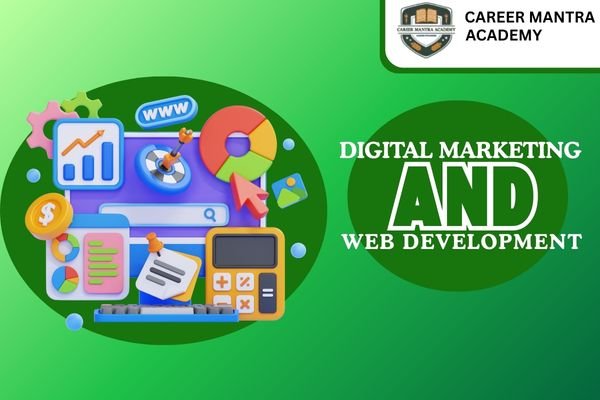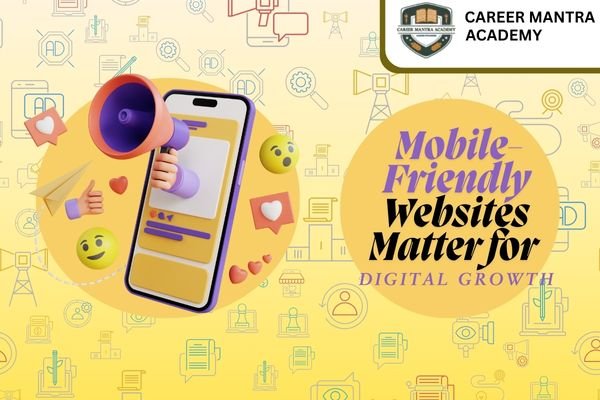
For Applying Digital Marketing Course Click Here…
Digital Marketing and Web Development:
A strong online presence is essential for businesses to thrive in today’s digitally-first world. Web development and digital marketing are two crucial pillars that enable this. Despite their apparent differences, they are closely related and together provide the framework for success on the internet.
Building, designing, and maintaining websites is the main focus of web development. It guarantees that a company has a platform that is quick, easy to use, and functional for interacting with clients. A well-designed website conveys professionalism, offers a smooth user experience, and contributes to the credibility of the brand. But without visibility, even the most well-designed website cannot reach its full potential.
Digital marketing can help with that. The tactic that increases website traffic, audience engagement, and visitor conversion is known as digital marketing. Among other things, it covers pay-per-click advertising, social media marketing, content marketing, and search engine optimization (SEO). Every one of these strategies guarantees that the appropriate audience discovers the website at the appropriate moment.
Digital marketing and web development work in perfect harmony when combined. While effective marketing without a strong website will not be able to retain users, a beautifully designed website with inadequate marketing will remain invisible. Companies that combine the two can increase conversions, enhance customer engagement, and increase their online visibility.
What is Digital Marketing?
The promotion of goods, services, or brands via digital channels and online platforms is known as digital marketing. It covers tactics like paid advertising, email campaigns, content marketing, social media marketing, and search engine optimization (SEO). In contrast to traditional marketing, digital marketing emphasizes audience targeting, real-time data measurement, and customized customer experiences. Its primary objective is to establish a solid online presence and reputation for the brand while drawing in, interacting with, and converting potential clients.
What is Web Development?
The process of building, designing, and maintaining websites to make sure they are useful, easy to use, and aesthetically pleasing is known as web development. It encompasses full-stack development, which combines front-end (what users see), back-end (server, database, and application logic), and front-end development. A well-designed website offers security, mobile responsiveness, quick loading times, and smooth navigation. Coding is only one aspect of web development; other tasks include performance, accessibility, and integration with digital marketing tools to support online business growth.

Why is Web Development Important for Digital Marketing Success?
Since every campaign eventually directs traffic to a website, web development is the foundation of digital marketing. A well-designed, user-friendly website that successfully turns visitors into devoted customers is the foundation of a strong online presence. Even the most inventive marketing techniques will have trouble producing results without a strong website.
Here’s why web development is essential for digital marketing success:
- First Impressions Matter: A professionally designed website creates trust and reflects brand credibility. Visitors often judge a business within seconds of landing on its site.
- SEO and Visibility: The way a website is coded, structured, and optimized affects how well it ranks on search engines. Faster loading speed, clean code, and mobile-friendly design are critical for SEO.
- Enhanced User Experience (UX): Smooth navigation, attractive layouts, and easy-to-find information keep users engaged longer.
- Boosting Conversions: Effective placement of calls-to-action (CTAs), optimized landing pages, and responsive forms improve lead generation and sales.
- Integration with Digital Tools: A well-developed site allows seamless use of analytics, email marketing, chatbots, and social media integration.
In summary, web development provides the strong foundation that digital marketing needs to thrive. It ensures visibility, improves user satisfaction, and helps businesses achieve higher engagement and conversions.
How Does SEO Link Digital Marketing and Web Development?
Web development and digital marketing are connected by SEO (Search Engine Optimization). Web development makes sure the website is technically optimized to rank well, while digital marketing concentrates on increasing traffic. Elements like URL structure, mobile responsiveness, site speed, and clean coding directly impact SEO performance. To attract the target audience, digital marketing strategies also utilize backlinks, keywords, and SEO-driven content. Even a well-designed website may remain invisible without SEO, and SEO campaigns may not produce the desired results without adequate web development. When combined, they guarantee that websites not only draw in more visitors but also offer a seamless user experience that maintains user engagement and promotes conversions.
How Does Website Design Influence User Experience and Conversions?
User experience (UX) is greatly influenced by website design, which also has a direct effect on conversion rates. A website that is easy to use and visually appealing encourages users to stay longer, explore the content, and take action. However, regardless of how successful the marketing campaign is, a poorly designed website can drive users away.
Key ways website design influences UX and conversions:
- Visual Appeal: A modern, clean design builds trust and strengthens brand identity.
- Navigation: Clear menus and logical layouts make it easier for users to find information quickly.
- Mobile Responsiveness: With most users browsing on phones, responsive design ensures accessibility across devices.
- Loading Speed: Fast-loading pages prevent drop-offs and improve satisfaction.
- Effective CTAs: Strategically placed buttons and forms guide visitors toward desired actions, boosting sales and leads.
In short, website design is more than looks—it enhances usability, fosters trust, and drives higher engagement, ultimately leading to improved conversions.
What Role Does Content Marketing Play in Web Development?
Web development and content marketing collaborate to build a strong online presence. A website’s structure and design are provided by web development, but its content marketing adds useful, interesting, and optimized content. Landing page content, videos, infographics, and blogs all contribute to increasing search engine rankings and drawing in visitors. A well-designed website guarantees that this content is presented efficiently, with simple navigation, quick loading times, and a mobile-friendly layout. In addition to educating users and guiding them through the sales funnel, high-quality content also fosters trust. Web development and content marketing work together to make sure that people find the website, stay on it, interact with it, and become customers.
How Can Social Media Be Integrated Into Websites for Marketing Growth?
Businesses looking to increase online visibility and engagement must incorporate social media into their websites. Social media sites like Twitter, Facebook, Instagram, and LinkedIn are excellent resources for increasing brand awareness, boosting traffic, and establishing connections with possible clients. Businesses can establish a smooth digital marketing ecosystem by integrating these platforms with a well-designed website.
Here are key ways to integrate social media effectively:
- Social Sharing Buttons: Adding share buttons on blog posts, product pages, or articles allows visitors to easily share content with their networks, expanding reach organically.
- Embedded Feeds: Displaying live social media feeds (like Instagram galleries or Twitter updates) makes the website dynamic and encourages users to follow your social profiles.
- Social Login Options: Allowing visitors to log in or register using social accounts simplifies the process, improving user experience and increasing sign-ups.
- Promotional Links and CTAs: Linking to social campaigns, contests, or events from the website encourages cross-platform engagement.
- User-Generated Content: Featuring customer reviews, testimonials, or posts from social media enhances credibility and builds trust.
Integrating social media strengthens both marketing and web development efforts. It increases website traffic, encourages audience interaction, enhances brand loyalty, and ultimately drives conversions. In today’s digital era, businesses that combine strong web development with active social media integration gain a competitive edge and foster long-term growth.
Why Is E-commerce Development Closely Tied to Digital Marketing?
Since a strong online store serves as the cornerstone of any marketing campaign, e-commerce development and digital marketing are closely related. A seamless shopping experience is created by web development, which guarantees that the website is quick, safe, mobile-responsive, and easy to use. Through paid advertisements, social media, email campaigns, and SEO, digital marketing brings in targeted customers to the store. When combined, they raise awareness, interact with potential clients, and increase conversions. Marketing campaigns may not convert without adequate e-commerce development, and even the greatest online store may go unnoticed without marketing.

Why Do Mobile-Friendly Websites Matter for Digital Growth?
Given that the majority of internet users access the internet through smartphones and tablets, mobile-friendly websites are essential in today’s digital environment. A responsive design guarantees a smooth user experience by adjusting the website to various screen sizes.
Key reasons why mobile-friendly websites drive digital growth:
- Improved User Experience: Easy navigation and readable content keep visitors engaged.
- Higher Search Engine Rankings: Google prioritizes mobile-optimized sites in search results.
- Increased Conversions: Simplified checkout and faster loading lead to higher sales or leads.
- Broader Reach: Mobile accessibility allows businesses to connect with users anytime, anywhere.
- Enhanced Brand Credibility: A professional, responsive site builds trust among visitors.
Overall, mobile-friendly websites are essential for attracting, retaining, and converting users effectively in the digital era.
How Do Analytics and Tracking Improve Marketing and Web Performance?
Analytics and tracking are crucial tools that assist companies in gauging the success of their web development and digital marketing initiatives. Businesses can determine what is effective and what requires improvement by tracking metrics like website traffic, user behavior, bounce rates, and conversion rates.
Key benefits include:
- Data-Driven Decisions: Insights from analytics help optimize marketing campaigns and website design.
- Audience Understanding: Tracking user behavior reveals preferences, interests, and engagement patterns.
- Performance Optimization: Businesses can improve page speed, navigation, and content based on analytics.
- ROI Measurement: Marketers can calculate the success of campaigns and adjust strategies accordingly.
In short, analytics and tracking ensure that websites and marketing efforts are continually refined for better results.

What Are the Latest Trends in Digital Marketing and Web Development?
Web development and digital marketing are always changing to adapt to new technology and shifting user habits. Businesses must keep up with the most recent trends in order to stay competitive.
Key trends include:
- AI and Chatbots: Automated interactions improve customer service and engagement.
- Voice Search Optimization: Websites and content are optimized for voice queries.
- Mobile-First Design: Prioritizing mobile usability for better user experience and SEO.
- Video Content Marketing: Videos attract more engagement and higher conversion rates.
- Progressive Web Apps (PWAs): Fast, app-like websites enhance user experience.
- Personalization: Tailored content and offers increase user satisfaction and retention.
By adopting these trends, businesses can improve reach, engagement, and overall online performance.
What Does the Future Hold for Digital Marketing and Web Development?
Web development and digital marketing are expected to become more inventive, data-driven, and user-focused in the future. To remain competitive as technology advances, businesses will need to adjust to shifting consumer habits, new platforms, and cutting-edge tools.
Key trends shaping the future:
- Artificial Intelligence (AI) and Machine Learning: AI will automate marketing strategies, personalize content, and predict consumer behavior for more effective campaigns.
- Voice and Visual Search: Optimizing websites for voice commands and visual searches will become essential for SEO.
- Immersive Experiences: Augmented Reality (AR) and Virtual Reality (VR) will offer interactive website experiences and marketing campaigns.
- Progressive Web Apps (PWAs) and Mobile-First Design: Fast, responsive, app-like websites will dominate user expectations.
- Data Privacy and Security: Enhanced measures will be crucial as users demand safer online interactions.
- Hyper-Personalization: Tailored content and experiences will increase engagement, retention, and conversions.
In short, the future will favor businesses that integrate advanced web development with innovative, user-centric digital marketing strategies to deliver meaningful and seamless experiences.
Conclusion.
Web development and digital marketing are two sides of the same coin that work together to create a powerful online presence. Digital marketing increases traffic, engagement, and conversions, while web development offers a useful, user-friendly platform. Businesses that integrate both are guaranteed to draw in the correct clientele, provide flawless experiences, and see quantifiable growth. Keeping abreast of trends, optimizing websites, and utilizing marketing strategies are crucial in today’s cutthroat digital environment. In the end, the combination of digital marketing and web development enables companies to establish enduring success online, increase brand credibility, and successfully engage with consumers.
FAQs
What is web development in digital marketing?
Web development in digital marketing refers to the process of creating and maintaining websites that serve as the foundation for online marketing efforts. It involves designing, coding, and optimizing websites to ensure they are fast, responsive, secure, and user-friendly. A well-developed website enhances user experience, supports SEO strategies, and integrates seamlessly with marketing tools like analytics, email campaigns, and social media platforms. In digital marketing, web development ensures that campaigns drive traffic to a site that can effectively engage visitors, generate leads, and convert them into customers, making it a critical component of online success.
What are the 7 types of digital marketing?
Digital marketing encompasses various strategies to promote products or services online. The seven key types include:
1. Search Engine Optimization (SEO): Improves website ranking on search engines to attract organic traffic.
2. Content Marketing: Uses blogs, videos, and infographics to engage and educate the audience.
3. Social Media Marketing: Promotes brands on platforms like Facebook, Instagram, and LinkedIn to build awareness and engagement.
4. Email Marketing: Sends personalized emails to nurture leads and retain customers.
5. Pay-Per-Click (PPC) Advertising: Paid ads on search engines or social media to drive targeted traffic.
6. Affiliate Marketing: Collaborates with partners to promote products and earn commissions.
7. Influencer Marketing: Leverages influencers to reach a larger, relevant audience.
These strategies work together to create a comprehensive digital marketing plan.
What are the three types of web development?
Web development can be broadly categorized into three types:
1. Front-End Development: Focuses on the part of the website that users interact with. It includes designing layouts, navigation, and visuals using HTML, CSS, and JavaScript to ensure an engaging user experience.
2. Back-End Development: Handles server-side operations, databases, and application logic. It ensures the website functions properly, processes data, and communicates with the front-end seamlessly.
3. Full-Stack Development: Combines both front-end and back-end development skills. Full-stack developers can build complete websites, managing design, functionality, and database integration, making them highly versatile in web development projects.
Is digital marketing a good career?
Yes, digital marketing is an excellent career choice in today’s technology-driven world. With businesses increasingly relying on online platforms, skilled digital marketers are in high demand across industries. The field offers diverse opportunities, including SEO, content marketing, social media management, email marketing, and paid advertising. It provides flexibility, creative freedom, and the potential for high earnings. Additionally, continuous technological advancements and evolving marketing trends ensure long-term career growth. Professionals can also work as freelancers, consultants, or entrepreneurs, making digital marketing a versatile and rewarding career path for those interested in combining creativity, analytics, and strategy.
Who is the father of digital marketing?
Philip Kotler, widely regarded as the “Father of Modern Marketing,” laid the foundation for many digital marketing principles. While Kotler originally focused on traditional marketing, his theories on segmentation, targeting, and positioning have been adapted to the digital era. Additionally, pioneers like Dan Shewan and early digital innovators contributed to shaping online marketing strategies. The rise of the internet, social media, and search engines has transformed marketing practices, but Kotler’s principles remain central to understanding consumer behavior and creating effective campaigns. His work continues to influence both traditional and digital marketing strategies worldwide.
What are the basics of web development?
Web development is the process of creating and maintaining websites. It includes front-end development (design and user interface), back-end development (servers, databases, and functionality), and full-stack development (both front-end and back-end). Key elements include responsive design, fast loading, security, and integration with tools like CMS or analytics. Mastering these basics ensures websites are functional, user-friendly, and support digital marketing efforts effectively.
Which digital marketing is best?
The best digital marketing strategy depends on business goals, target audience, and budget. SEO is ideal for long-term organic growth, social media marketing builds engagement, and PPC advertising drives immediate traffic. A combination of these strategies often delivers the most effective results.
What are the qualifications for digital marketing?
Digital marketing doesn’t require a specific degree, but a bachelor’s in marketing, business, or communications is beneficial. Key qualifications include knowledge of SEO, social media, content creation, analytics, and paid advertising. Certifications from platforms like Google, HubSpot, or Facebook enhance credibility and improve career opportunities in the field.
Which type of digital marketing is best for beginners?
For beginners, social media marketing and content marketing are the easiest to start with. They require creativity, basic analytical skills, and familiarity with platforms like Facebook, Instagram, or blogs. These areas allow beginners to learn audience engagement, content creation, and basic marketing strategies. Over time, they can expand into SEO, email marketing, or paid advertising for more advanced opportunities.
